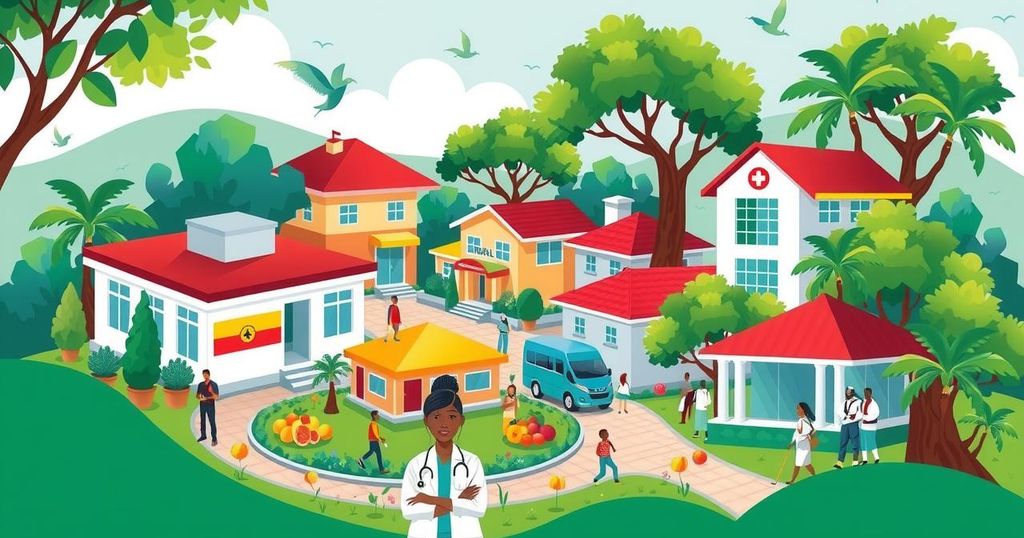Today marks five years since Ghana’s first COVID-19 case, revealing substantial advancements in its public health system. The pandemic highlighted the necessity for a coordinated response and the establishment of Public Health Emergency Operation Centers. Enhanced laboratory capacity and the integration of technology have improved disease surveillance and case management significantly. The pandemic also initiated local vaccine production capabilities through the National Vaccine Institute, establishing a foundation for future health emergency preparedness.
On March 12, 2025, Ghana commemorates five years since the first COVID-19 case was confirmed in the country. This pandemic posed a significant challenge to public health systems globally, including Ghana, where approximately 172,000 cases and 1,462 deaths occurred. Despite these hardships, Ghana’s surveillance mechanisms remained strong until the World Health Organization declared the pandemic over in 2023, illustrating the nation’s resilience in managing health crises.
Ghana’s response to the pandemic was distinguished as one of the most efficient globally due to its effective case detection, management, and virus transmission control. This anniversary serves as an opportunity to reflect on significant public health advancements that have transformed Ghana’s health infrastructure, preparing it better for future health emergencies. The first case surfaced while the country was already handling outbreaks of circulating vaccine-derived poliovirus type 2 (cVDPV2), necessitating a comprehensive governmental response to pandemic management.
The effective coordination of response efforts by the central government, along with inter-ministerial collaboration, underscored the urgent need for prioritized public health initiatives in Ghana. This whole-of-government approach substantially elevated public health to the forefront of national priorities for the first time in many years, creating favorable conditions for systemic transformation in policy and practice.
The pandemic presented a vital opportunity to enhance disease surveillance, case management, public health policies, and workforce capacity. Notably, the establishment of Public Health Emergency Operation Centers (PHEOCs) at national and regional levels proved essential in synchronizing and managing pandemic responses while addressing other public health outbreaks during this period.
Furthermore, the public health landscape evolved with the digital transformation of disease surveillance systems. The implementation of the Surveillance Outbreak Response Management and Analysis System (SORMAS) replaced older paper-based models, significantly bolstering Ghana’s capacity to respond to various outbreaks post-pandemic and enhancing public health practices at all levels.
The pandemic also led to significant enhancements in laboratory testing capabilities, including innovative strategies like pooled testing. As a consequence, Ghana ranked highly in the WHO African Region (AFRO) for COVID-19 testing per capita. The crisis further catalyzed the utilization of flagship laboratories across the country, including the Noguchi Memorial Institute for Medical Research (NMIMR) and the Kumasi Centre for Collaborative Research in Tropical Medicine (KCCR), showcasing the integration of public health infrastructure with wider health system capacities.
A noteworthy achievement was the establishment of a coordinated case management system, ensuring each region had a dedicated team for serious COVID-19 cases. The government worked closely with private partners to create the Ghana Infectious Disease Centre (GIDC), a 100-bed facility offering specialized care which will continue to serve vital functions in managing infectious diseases in the future.
Public-private partnerships played a pivotal role during the pandemic, promoting innovation and self-sufficiency in Ghana’s health response. The private sector’s support in producing personal protective equipment (PPE), medications, and sanitizers ensured consistent protection for healthcare workers and facilitated availability of essentials for the public during peak pandemic periods.
The pandemic further strengthened collaborations between academia, public health experts, and policymakers, fostering rapid development of guidelines and policy recommendations based on real-time data insights. The fusion of scientific inquiry and policy formulation proved essential in strategizing Ghana’s COVID-19 response, establishing a model for tackling future health crises.
One significant outcome of the pandemic was the realization of the necessity for local vaccine production, leading to the establishment of the National Vaccine Institute (NVI). This initiative aims to strengthen Ghana’s capability to respond to future outbreaks and manage vaccine-preventable diseases effectively.
Despite the disruptions caused by COVID-19, Ghana’s public health system emerged with notable enhancements in disease surveillance, laboratory capacity, and public-private collaborations. Such improvements should be cultivated to sustain a resilient and proactive public health framework capable of addressing ongoing and emerging infectious disease threats.
Five years post-COVID-19, Ghana’s public health landscape has undergone significant transformations, enhancing its response capabilities and institutional resilience. Improvements in disease surveillance, laboratory capacity, and case management reveal a nation that is learning and adapting from unprecedented challenges. As Ghana prepares for potential future health crises, leveraging these successes will be critical in maintaining a robust public health environment.
Original Source: www.ghanaweb.com






